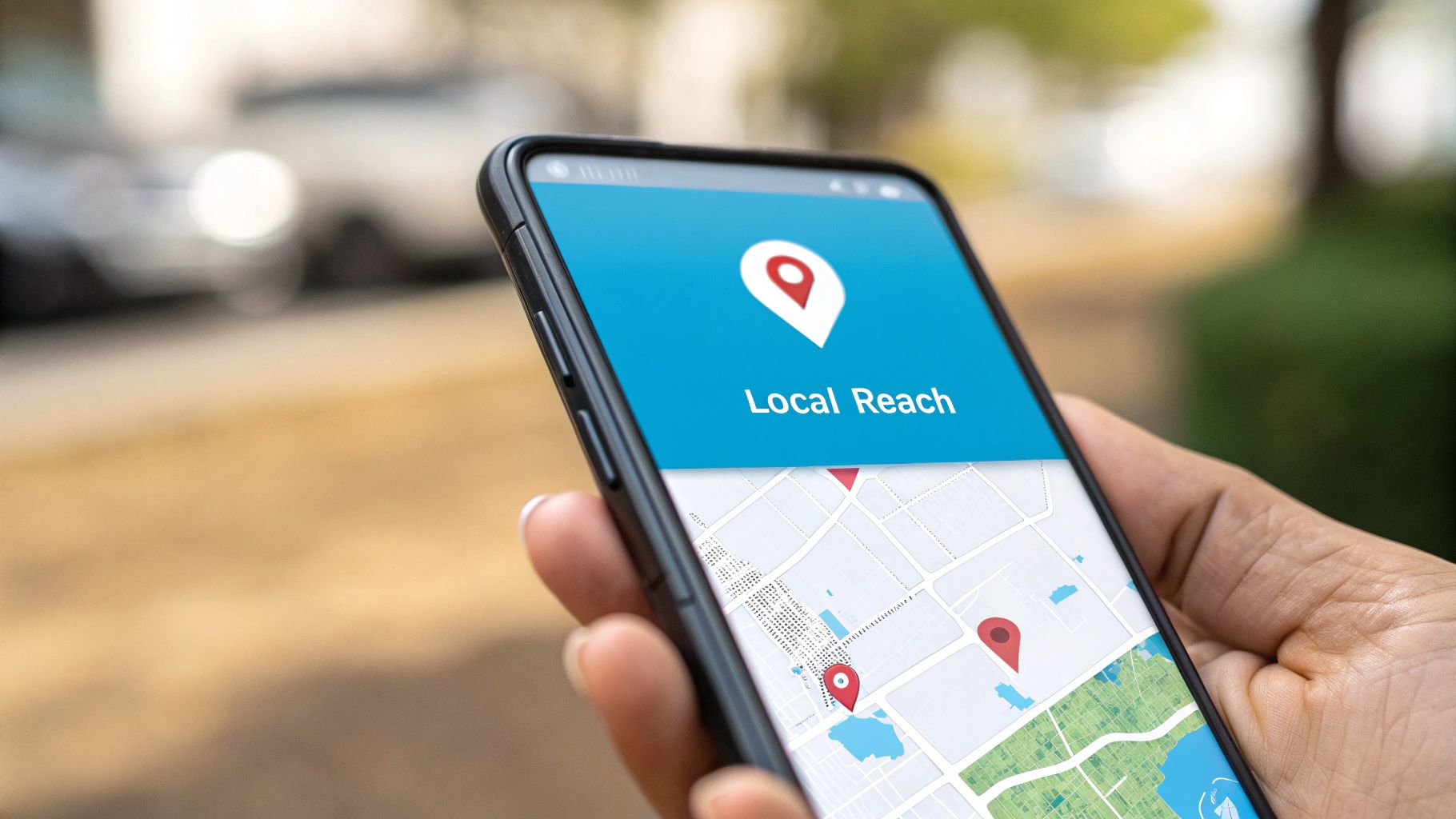Level Up Your Leasing Game
Attract more owners and keep vacancies low with effective property management marketing. This listicle delivers seven proven property management marketing ideas to boost your bottom line. Learn how content marketing, local SEO, referral programs, virtual tours, email automation, online reputation management, and digital advertising can transform your leasing operations. These strategies will help you connect with potential clients, build trust, and ultimately secure more leases. Discover how to modernize your approach and dominate your market.
1. Property Management Content Marketing
Property management content marketing is a powerful strategy for attracting both property owners and potential tenants. It revolves around creating and distributing valuable, relevant, and consistent content designed to educate, engage, and ultimately convert your target audience. By offering helpful resources and insights, you position your property management company as a trusted expert in the field, building credibility and fostering long-term relationships. This approach goes beyond traditional advertising, focusing on providing genuine value that addresses the needs and concerns of your audience. Think of it as building a library of resources that draws people to your business organically.

This method deserves a top spot in any property management marketing plan because it delivers sustainable, long-term results. Unlike paid advertising which stops working the moment you stop paying, content marketing continues to generate leads and build brand authority over time. It's an investment that keeps on giving.
Features of Effective Content Marketing:
- Educational Blog Posts: Covering topics like property maintenance, tenant screening, and investment strategies.
- How-to Guides: Offering practical advice to property owners on topics such as maximizing rental income or handling difficult tenants.
- Video Tours and Property Showcases: Giving prospective tenants a virtual glimpse of available properties, boosting engagement and saving time.
- Downloadable Resources: Providing valuable checklists, templates, and ebooks on relevant property management topics in exchange for contact information, generating leads and building your email list.
- Email Newsletters: Sharing regular property insights, market updates, and company news directly to your subscribers' inboxes.
Pros:
- Builds Authority and Credibility: Positions your company as a knowledgeable resource in the property management industry.
- Improves Search Engine Visibility (SEO): High-quality content helps your website rank higher in search engine results, driving organic traffic.
- Creates Long-Term Assets: Content continues to attract leads and generate interest long after its initial publication.
- Educates Property Owners: Demonstrates your expertise and the value you bring to the table, making you a more attractive option.
- Repurposable Content: A single piece of content, like a blog post, can be repurposed into multiple formats, such as videos, infographics, or social media posts, maximizing its reach and impact.
Cons:
- Requires Consistent Time Investment: Creating high-quality content takes time and effort.
- Delayed Gratification: Results typically take several months to materialize.
- Needs Regular Updating: Content needs to be refreshed and updated to stay relevant and maintain its value.
- Requires Expertise: Effective content marketing requires knowledge of both property management and content creation best practices.
Examples of Successful Implementation:
- Mynd Property Management: Provides a robust resource center filled with guides and tips for investment property owners.
- Buildium: Offers a comprehensive blog covering industry trends and best practices for property managers.
- Real Property Management: Utilizes YouTube to share educational videos addressing common landlord issues.
Actionable Tips:
- Focus on Solving Pain Points: Address the common challenges and concerns of property owners and tenants. What keeps them up at night? What questions do they frequently ask?
- Create a Content Calendar: Plan your content in advance, aligning it with seasonal property concerns and industry events.
- Repurpose Your Content: Transform blog posts into videos, infographics, or social media updates to reach a wider audience.
- Include Clear Calls-to-Action: Tell your audience what you want them to do next (e.g., download a guide, request a consultation, schedule a showing).
- Track Your Results: Monitor which content pieces are driving the most leads and adjust your strategy accordingly.
When and Why to Use This Approach:
Content marketing is ideal for property management companies looking to establish long-term growth and build a strong brand reputation. It's particularly effective for attracting property owners seeking knowledgeable and trustworthy management partners. While it requires consistent effort and patience, the long-term benefits of increased visibility, lead generation, and brand authority make it a worthwhile investment for any property management business, especially those targeting single-family property managers, property management companies, large rental portfolio owners, and tenant placement companies.
2. Local SEO for Property Management
Local SEO is a crucial property management marketing idea, focusing on optimizing your online presence to attract more business from relevant local searches. This means ensuring that when property owners in your area search for "property management services," "rental management," or similar terms, your business appears prominently in search engine results pages (SERPs) and Google Maps listings. This targeted approach connects you with potential clients actively seeking services precisely like yours, right in their neighborhood.

Local SEO leverages several key features: optimizing your Google Business Profile (GBP) with accurate and up-to-date information, targeting location-specific keywords (e.g., "property management Denver"), creating landing pages dedicated to specific service areas, building citations across relevant online directories, implementing a review management system, and pursuing local link-building opportunities. These tactics combine to boost your visibility and credibility within your target market.
Companies like Property Management Inc., Greystar, and Real Property Management demonstrate successful local SEO implementation. Property Management Inc. optimizes Google Business Profiles for each franchise location, ensuring strong local visibility for each branch. Greystar uses location-specific landing pages for every market they serve, providing tailored content and information to prospective clients in each area. Real Property Management leverages its network of locally optimized franchise websites to dominate search results in various regions.
Why Local SEO Matters for Property Management
Local SEO deserves a prominent place on this list because it directly targets high-intent, location-specific searches. Property owners looking for management services are actively searching for solutions in their area. Local SEO helps you capture this valuable audience, driving qualified leads from nearby property owners who are ready to convert. Furthermore, it strengthens your brand's online presence, builds trust through reviews and local engagement, and generally faces less competition than broader national SEO efforts.
Pros:
- Targets high-intent, location-specific searches
- Improves visibility in Google Maps and local pack results
- Generally less competitive than national SEO
- Builds trust through reviews and local presence
- Drives qualified leads from nearby property owners
Cons:
- Requires ongoing maintenance and monitoring
- Competition can be fierce in dense urban markets
- Algorithm changes can affect rankings
- Takes time to build local authority
Actionable Tips for Property Managers:
- Create unique pages for each service area: Develop content tailored to the specific needs and characteristics of each location you serve.
- Actively solicit and respond to Google reviews: Positive reviews build trust and influence potential clients.
- Ensure NAP (Name, Address, Phone) consistency: Accurate and consistent NAP information across all platforms is crucial for local SEO.
- Participate in local community events: Sponsoring or participating in local events can generate valuable local backlinks.
- Optimize for neighborhood-specific keywords: Target long-tail keywords that reflect specific neighborhoods or areas within your service region (e.g., "property management Capitol Hill Denver").
By implementing these local SEO strategies, single-family property managers, property management companies, large rental portfolio owners, and tenant placement companies can effectively reach their target audience, enhance their online visibility, and ultimately grow their businesses within their desired service areas. Tools and research from companies like BrightLocal, Moz Local, and Whitespark can assist in your local SEO journey.
3. Property Management Referral Programs
Property management referral programs are a powerful way to leverage the trust you've built with existing clients and partners to generate new business. This "word-of-mouth" marketing tactic incentivizes satisfied property owners, real estate agents, contractors, and other related professionals to recommend your services in exchange for rewards. These programs offer a highly effective way to acquire pre-qualified leads, often at a lower cost than traditional advertising. This makes referral programs a valuable addition to any property management marketing strategy.

A well-structured referral program typically includes features like financial incentives (e.g., discounts, cash bonuses, commission sharing), tiered reward structures based on the value of the referral (e.g., higher rewards for larger properties), and online referral tracking systems to manage the process efficiently. Some programs also incorporate co-marketing opportunities with partners and recognition programs for top referrers. For example, you might offer branded marketing materials to real estate agents who refer clients, or highlight top referring owners in a client newsletter.
Examples of Successful Implementation:
- RentVest Property Management: Offers one month's management fee for successful referrals, directly incentivizing existing owners.
- Coldwell Banker: Provides tiered gift cards ranging from $250 to $1000 based on the size and value of the referred property, catering to different referral sources.
- Keller Williams Property Management: Operates an agent referral network with commission sharing, creating a mutually beneficial relationship with real estate professionals.
Pros:
- High-Quality Leads: Referrals typically come from trusted sources, resulting in pre-qualified leads with higher conversion rates.
- Lower Acquisition Cost: Compared to paid advertising or other marketing channels, referral programs can significantly reduce the cost of acquiring new clients.
- Relationship Building: Rewards and recognition strengthen relationships with existing clients and partners.
- Network Effect: As your client base grows through referrals, the potential for further referrals expands exponentially.
- Brand Building: A successful referral program builds community and fosters a positive brand image.
Cons:
- Dependence on Service Quality: Generating referrals relies on providing exceptional service that inspires clients to recommend you.
- Competitive Incentive Structures: In highly competitive markets, substantial incentives may be required to attract referrals.
- Tracking and Fulfillment: Efficient tracking and reward fulfillment systems are essential for program success.
- Scalability: While effective, referral programs can be more challenging to scale rapidly compared to some digital marketing channels.
Tips for Creating an Effective Program:
- Simplify the Process: Use online forms and automated tracking to make referring easy for clients and partners.
- Regular Communication: Promote the program consistently through email newsletters, client portals, and during regular interactions.
- Diversify Rewards: Consider both monetary and non-monetary rewards, such as discounted services or property upgrades.
- Target Real Estate Agents: Create specialized incentives for real estate agent partnerships, as they are a valuable source of referrals.
- Personalize Your Gratitude: Go beyond simply providing the reward. Personally thank referrers to show your appreciation and strengthen the relationship.
Why Referral Programs Deserve a Place in Your Marketing Strategy:
For property managers, particularly those focused on single-family homes, large rental portfolios, or tenant placement, referral programs offer a sustainable and cost-effective way to grow your business. By tapping into your existing network and providing valuable incentives, you can generate a steady stream of high-quality leads, build stronger relationships, and establish your brand as a trusted leader in the property management industry. The inherent trust associated with referrals often leads to quicker conversions and higher client lifetime value, making referral programs a powerful engine for long-term growth.
4. Virtual Property Tours and Visual Marketing
In today's fast-paced digital world, prospective tenants expect more than just static photos and basic descriptions. Virtual property tours and visual marketing offer a powerful way to capture their attention and streamline the leasing process. This innovative approach leverages technology to showcase rental properties through immersive 3D tours, engaging video walkthroughs, and high-quality photography, allowing potential tenants to explore properties remotely, anytime, anywhere. This not only saves time for both parties but also significantly broadens your reach, attracting a wider pool of qualified applicants.

This strategy is a must-have for modern property management marketing, effectively pre-qualifying leads and reducing costly vacancy periods. Features like 3D virtual tours using platforms like Matterport, professional photography, drone footage (particularly beneficial for showcasing larger properties and highlighting appealing exterior features), and property manager-narrated video walkthroughs provide an unparalleled level of detail and engagement. For vacant properties, virtual staging can transform empty spaces into inviting homes, helping potential tenants visualize themselves living there. Interactive floor plans further enhance the experience, offering a clear understanding of the property's layout and flow.
Companies like Greystar have successfully implemented Matterport tours across their luxury apartment communities, demonstrating the effectiveness of this technology in attracting high-quality tenants. PMI utilizes branded video walkthroughs with consistent formatting across their properties, reinforcing brand identity and creating a professional, cohesive experience. Invitation Homes leverages virtual staging to breathe life into vacant properties, accelerating the leasing process.
Pros:
- Saves time: Pre-qualifies interested tenants by allowing them to self-select based on a thorough virtual viewing.
- Reduces vacancy periods: Wider reach attracts more potential tenants, leading to faster occupancy.
- Enables remote property viewing: Caters to relocating tenants or those unable to attend in-person showings.
- Provides 24/7 property access: Eliminates the need for scheduling and accommodates busy schedules.
- Demonstrates technological competence: Showcases your forward-thinking approach to property owners.
- Reduces showing no-shows: By allowing potential tenants to thoroughly explore the property virtually beforehand, no-show rates decrease by an average of 40%.
Cons:
- Initial investment: Requires investment in equipment (cameras, drones) or professional services.
- Regular updating: Visual content needs to be updated as properties change or undergo renovations.
- Technology learning curve: Staff needs to be trained on using the technology effectively.
- Potential to highlight flaws: Detailed virtual tours may reveal property imperfections that could be downplayed during an in-person showing.
Tips for Implementation:
- Consistency is key: Maintain a consistent visual style across all your property listings to build brand recognition.
- Showcase the surroundings: Include footage of the neighborhood and highlight nearby amenities to provide context and appeal.
- Include calls-to-action: Embed clear calls-to-action within your virtual tours, encouraging viewers to submit applications or contact you for more information.
- Leverage social media: Share your visual content across various social media platforms to maximize exposure.
- Track performance: Monitor which visual assets generate the most inquiries and applications to refine your strategy.
Virtual property tours and visual marketing are no longer a luxury but a necessity in the competitive property management landscape. By embracing this innovative approach, you can attract more qualified tenants, reduce vacancy rates, and position yourself as a leader in the industry. This method is particularly valuable for single-family property managers, property management companies, large rental portfolio owners, and tenant placement companies looking to optimize their marketing efforts and achieve higher occupancy rates.
5. Email Marketing Automation for Property Management
Email marketing automation is a powerful tool in any property management marketing strategy, enabling you to nurture relationships with property owners, tenants, and prospects through targeted, personalized email sequences. This approach deserves a spot on this list because it delivers relevant information at the right time, streamlining communication while generating and converting leads, ultimately contributing to a more efficient and profitable business. It's particularly valuable for Single-Family Property Managers, Property Management Companies, Large Rental Portfolio Owners, and Tenant placement companies looking to scale their operations effectively.
How it Works:
Email marketing automation works by segmenting your audience (owners, tenants, prospects) and setting up triggered email sequences based on specific behaviors or events. For example, a new tenant might receive a welcome email series with helpful resources, while a prospective owner could receive a drip campaign showcasing your management services. Personalized content based on property types and individual preferences ensures relevance and engagement. Regular newsletters keep your audience informed with market updates, property management tips, and company news. Automation also handles essential tasks like maintenance notifications and lease renewal reminders, saving you valuable time and resources.
Features and Benefits:
- Segmented email lists: Target specific groups with tailored messaging.
- Triggered email sequences: Automate communications based on actions or events.
- Personalized content: Increase engagement with relevant information.
- Regular newsletters: Stay top-of-mind and provide valuable insights.
- Automated maintenance and renewal notifications: Streamline essential processes.
- Lead nurturing campaigns: Guide prospects through the sales funnel.
Pros:
- Efficiency: Maintains regular communication without manual effort.
- Measurable ROI: Track key metrics like open rates, click-through rates, and conversions.
- Lead Nurturing: Guides potential clients through the decision-making process.
- Relationship Building: Fosters stronger connections with consistent touchpoints.
- Reduced Vacancy Rates: Timely renewal reminders encourage tenant retention.
- Cost-Effectiveness: A highly affordable marketing channel compared to traditional methods.
Cons:
- Initial Setup: Requires time and strategic planning to implement effectively.
- Content Creation: Demands ongoing content development for newsletters and campaigns.
- Impersonal Risk: Can feel impersonal if poorly implemented, lacking genuine connection.
- Deliverability Issues: Requires adherence to best practices to avoid spam filters.
Examples of Successful Implementation:
- AppFolio: Integrates automated emails for maintenance requests and lease renewals, streamlining communication between tenants and property managers.
- Propertyware: Utilizes drip campaigns for potential property owner clients, showcasing the benefits of their management services.
- RentVest: Sends monthly market update newsletters with local market statistics, positioning themselves as industry experts.
Actionable Tips:
- Segment your audience: Divide your email list based on client type (owner, tenant, prospect), property type, and stage in their journey.
- Craft targeted welcome sequences: Create separate welcome series for new owners and tenants, providing relevant information and resources.
- Provide value-driven content: Share valuable market insights, property management tips, and local news, not just promotional material.
- Optimize for open rates: Test different subject lines and sending times to maximize engagement.
- Integrate with your property management software: Automate triggered communications based on specific events within your software system.
Popular Email Marketing Platforms:
- Mailchimp: A user-friendly email marketing platform ideal for beginners.
- HubSpot: Offers comprehensive marketing automation tools for more advanced users.
- ActiveCampaign: Provides sophisticated automation capabilities for complex campaigns.
By leveraging email marketing automation strategically, property managers can enhance communication, nurture leads, improve tenant retention, and ultimately drive business growth. This cost-effective method provides a significant return on investment when implemented effectively, making it a valuable asset for any property management marketing plan.
6. Social Proof and Online Reputation Management
In the competitive property management landscape, trust is paramount. Potential clients need assurance that their valuable assets are in capable hands. That's where social proof and online reputation management become invaluable property management marketing ideas. This strategy leverages the power of reviews, testimonials, and case studies to build credibility and demonstrate your expertise, ultimately attracting new business. It's no longer enough to tell potential clients you're the best; you need to show them.
How It Works:
Social proof marketing hinges on the principle that people are heavily influenced by the opinions and experiences of others. By showcasing positive feedback and successful client relationships, you create a compelling narrative that resonates with prospects. This involves actively managing your online reputation across various review platforms, responding to feedback (both positive and negative), and strategically highlighting positive experiences in your marketing materials.
Features of Effective Social Proof Marketing:
- Systematic Review Collection Process: Develop a streamlined process for requesting reviews from satisfied clients at key touchpoints, such as after a successful lease or a resolved maintenance issue.
- Testimonial Showcases: Prominently display client testimonials on your website, in brochures, and across social media channels. Video testimonials are particularly impactful.
- Case Studies: Develop compelling case studies that demonstrate your expertise and the value you bring to clients. Highlight specific achievements, such as improved property performance, increased rental income, or reduced vacancy rates.
- Review Monitoring and Response Protocols: Actively monitor review platforms like Google, Yelp, and industry-specific sites. Respond promptly and professionally to all reviews, addressing concerns and thanking clients for their feedback.
- Review Widgets and Website Integration: Embed review widgets on your website to showcase positive reviews directly to visitors.
- Social Media Highlighting: Share client success stories and positive reviews on your social media channels to amplify their reach.
Pros:
- Builds Immediate Trust: Third-party validation from satisfied clients carries significant weight and instills trust in potential clients.
- Influences Decision-Making: Positive reviews and testimonials can sway prospects at crucial conversion points.
- Improves Search Engine Visibility: Positive review signals can boost your search engine rankings, making it easier for potential clients to find you.
- Creates Compelling Content: Testimonials and case studies provide ready-made content for various marketing channels.
- Addresses Common Objections: By showcasing positive experiences, you can proactively address common concerns and objections that potential clients might have.
Cons:
- Vulnerability to Negative Reviews: While negative reviews are inevitable, how you respond to them is crucial. A professional and empathetic response can often turn a negative experience into a positive one.
- Requires Ongoing Management and Monitoring: Maintaining a positive online reputation requires consistent effort and attention.
- Difficulty in Obtaining Reviews: Busy clients may not always be willing or able to provide reviews, requiring gentle reminders and a simple review process.
- Review Platform Policies: Be aware of and adhere to the specific solicitation policies of each review platform.
Examples of Successful Implementation:
- PMI (Property Management Inc.): Their dedicated testimonial page features video testimonials from property owners, showcasing the positive impact of their services.
- Real Property Management: Their website features case studies demonstrating ROI for investment properties, appealing directly to a key target audience.
- Mynd Property Management: They integrate Google reviews directly onto their property listing pages, providing immediate social proof to prospective tenants.
Actionable Tips:
- Implement a systematic review request process at key satisfaction points in the client journey.
- Create segmented testimonials by property type or client concern to address specific needs.
- Respond promptly and professionally to all reviews, both positive and negative.
- Feature real performance data (vacancy rates, maintenance savings, etc.) in case studies to demonstrate tangible results.
- Train your staff on the importance of the client experience and its impact on online reviews.
Why This Deserves a Place in the List:
In today's digital age, online reputation is everything. For property managers, social proof and online reputation management aren't just marketing tactics – they're essential for survival and growth. By proactively cultivating a positive online presence, you can build trust, attract new clients, and solidify your position as a leader in the property management industry. This approach is particularly crucial for single-family property managers, property management companies, large rental portfolio owners, and tenant placement companies, all of whom rely heavily on client trust and satisfaction. Leveraging platforms like BirdEye and Reputation.com, and understanding Google's emphasis on reviews, can significantly enhance your marketing efforts.
7. Digital Advertising for Property Management
In today's digital landscape, a strong online presence is crucial for success, making digital advertising one of the most effective property management marketing ideas. Digital advertising for property management encompasses targeted paid campaigns across platforms like Google, Facebook, and LinkedIn, allowing you to reach property owners, investors, and even potential tenants directly. This approach leverages precise audience targeting and compelling ad creative to generate qualified leads interested in your property management services. This strategy is a powerful tool for single-family property managers, property management companies, large rental portfolio owners, and tenant placement companies looking to expand their reach and grow their business.
How it Works:
Digital advertising platforms offer a variety of ad formats and targeting options. You can target specific demographics, interests, locations, and even online behaviors. For example, you can target homeowners in a specific zip code who have also shown interest in investment properties. When these targeted individuals are online, your ads appear, driving them to your website or landing page where they can learn more about your services.
Features:
- Google Ads campaigns: Target specific keywords related to property management services, ensuring your ads appear to users actively searching for these services.
- Facebook/Instagram Ads: Utilize demographic and behavioral targeting to reach property owners and investors based on their interests, online activity, and location.
- LinkedIn Ads: Target professionals in the real estate industry, including investors and property owners, with tailored messaging about your services.
- Retargeting Campaigns: Reconnect with website visitors who have shown previous interest in your services but haven't yet converted.
- Geotargeted Display Advertising: Display visually appealing ads on websites and apps frequented by your target audience within specific geographic areas.
- YouTube Pre-roll Ads: Showcase your services through short video ads played before YouTube videos, capturing the attention of potential clients.
Pros:
- Provides immediate visibility and lead generation: See results quickly with increased website traffic and inquiries.
- Allows precise targeting of property owners: Reach the right audience by location, demographics, and interests, minimizing wasted ad spend.
- Offers scalable campaigns: Adjust your budget and campaign scope based on your goals and resources.
- Delivers measurable results and clear ROI tracking: Track key metrics like impressions, clicks, conversions, and cost per lead to assess campaign effectiveness.
- Can be adjusted in real-time based on performance: Optimize campaigns on-the-fly to improve results and maximize ROI.
Cons:
- Can be expensive in competitive markets: Bidding on popular keywords can drive up ad costs.
- Requires ongoing optimization and management: Regular monitoring and adjustments are necessary to maintain campaign performance.
- Ad fatigue can occur without fresh creative: Regularly update ad copy and visuals to keep your audience engaged.
- Click fraud can impact campaign efficiency: Implement measures to mitigate fraudulent clicks that can deplete your budget.
Examples of Successful Implementation:
- PMI's hyper-local Facebook campaigns: Targeting neighborhoods with high landlord concentrations, PMI effectively reaches property owners with tailored messaging.
- Greystar's Google Ads campaigns: Focusing on property management service keywords, Greystar captures leads from individuals actively searching for these services.
- FirstKey Homes' retargeting campaign: Reconnecting with website visitors showing specific service interests, FirstKey Homes nurtures leads and encourages conversions.
Tips for Effective Digital Advertising:
- Create separate campaigns for different property types and management services: Tailor your messaging and targeting for specific audiences and services.
- Develop landing pages specifically aligned with ad messaging: Provide a seamless user experience and encourage conversions.
- Test different ad formats and messages to identify top performers: A/B testing helps optimize your campaigns for maximum effectiveness.
- Implement proper conversion tracking to measure ROI beyond clicks: Track leads, inquiries, and other valuable actions to assess true campaign value.
- Consider seasonal adjustments to campaigns based on market activity: Adapt your campaigns to reflect seasonal trends and market fluctuations.
Popularized By:
- Google Ads platform
- Facebook Business Suite
- LinkedIn Marketing Solutions
Digital advertising deserves its place on this list of property management marketing ideas because it offers a direct, measurable, and scalable way to reach your target audience. By leveraging the power of platforms like Google, Facebook, and LinkedIn, you can generate high-quality leads, build brand awareness, and ultimately grow your property management business. This approach provides a significant advantage in today’s competitive market, allowing you to connect with potential clients precisely when they are searching for your services.
7-Point Marketing Strategy Comparison
Maximize Your Marketing Impact
Successfully marketing your property management services requires a multifaceted approach. From leveraging the power of content marketing and local SEO to embracing virtual tours and building a strong online reputation, the property management marketing ideas discussed in this article provide a roadmap to attract and retain clients. Remember, the key takeaways are consistency, adaptability, and a focus on providing value to your target audience – whether that's single-family property managers, large rental portfolio owners, or tenant placement companies. Mastering these concepts will not only fill your vacancies faster but also establish your brand as a leader in the competitive property management landscape, fostering long-term growth and success. By focusing on these strategies, you'll be well-positioned to attract high-quality tenants and build lasting relationships with property owners.
Want to streamline your operations and free up more time to focus on implementing these vital property management marketing ideas? Showdigs automates time-consuming tasks, allowing you to focus on what matters most: growing your business. Learn how Showdigs can revolutionize your property management marketing at Showdigs.





.png)

.png)